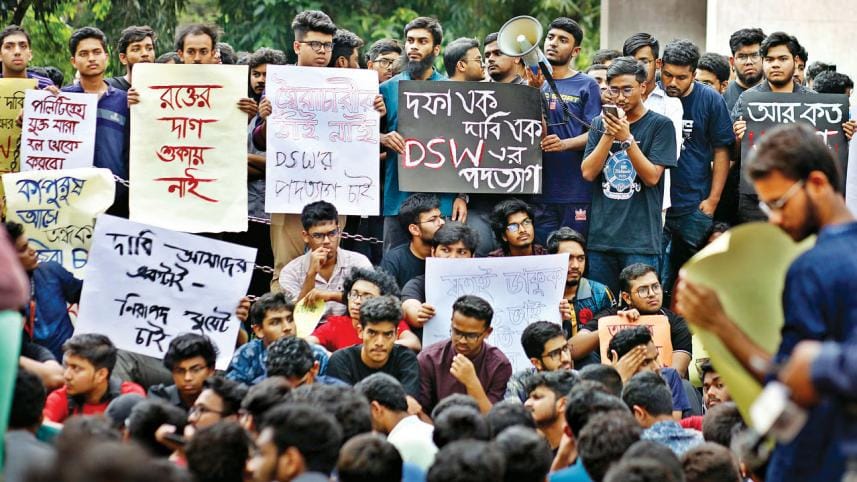Lessons learnt: Partisan student politics must be banned

We are living in a new Bangladesh. Our country has witnessed a historic turning point. Following decades of seemingly interminable corruption within our government, the nation finally looks forward to emerging from the shadows of oppression. The courageous uprising led by the students, fuelled by the collective will of all the people who chose not to be frightened any longer, has resulted in the formation of an ambitious interim government. This finally marks the long-awaited beginning of a new era.
Among all the pursuits we trust the interim government shall work upon, I would like to humbly urge, on behalf of all the upright and peace-loving students, to consider banning party-based student politics permanently. So far, Chittagong University of Engineering and Technology (CUET) has officially imposed a ban on student politics as well as prohibited political affiliations amongst its faculty and administrative personnel. Although private universities are generally considered to be free from student politics, records of multiple attempts to form such committees were seen there in recent years. Nonetheless, the last fifteen years have sufficiently established how members of educational institutions, as well as the general public, have been troubled by partisan politics. Atrocious acts of violence in campuses and beyond, especially during the last few weeks, show just how heinous the actions of student political parties can be.
However, it must be acknowledged that student engagement in politics is essential for the growth of a vibrant democracy. The youth has displayed just how politically informed they can be for the betterment of the country. Young minds must be given the needed leverage to constructively analyse, question, and participate in political processes. At the same time, such practices so far have been channelled through unbiased means that prioritise dialogue and debate over violent confrontations.
Given everything we have witnessed so far, the necessity to distinguish between legitimate political activism and the exploitation of students for partisan motives is more evident than ever. While students, like everyone else, should be free to express their views as well as affiliations, it is unacceptable for any political party to use the students to claim campuses as breeding grounds for violence, intimidation, or malicious dominance.
It is deplorable how the previous government did not find it shameful to allow students to be harassed, beaten, and even killed to satisfy political desires. In recent years, undue superiority exercised by the party-based political goons crossed all boundaries.
Within the student body, female students have been frightened by the possibilities of being harassed by members of such parties, whether they're on campus or within the walls of their own homes. Malpractices like ragging, harassment, assault in every possible way keep the general students worried throughout their academic lives, and even beyond. This not only endangers their safety and wellbeing, but very negatively impacts their academics and scopes for fairly practicing leadership.
These crises in educational institutions, especially universities, calls out for immediate and decisive action. The most crucial step would be to permanently ban partisan politics within institutions through a strong executive order.
This ban must further extend to faculty members and all other staff members within the institutions. All the students, faculty members, and staff members should be required to agree in writing as soon as the order is passed, formalising their assurance in abiding by the order faithfully. Taking the undertaking in writing should remain in force as long as the executive order will be effective, making sure that it is mandatorily taken whenever one joins any institution as a teacher, staff member, or student in the future. Furthermore, no student should be given the opportunity to affiliate themselves with any political party as long as they are a full-time student at any institution.
Enforcing the ban on partisan politics may be the one of the few viable options to restore peace and order on our campuses, as well as ensuring safety throughout the nation. Party-based political involvements in any manner should have no place in institutions for the preservation of ethical practices.
Additionally, the government should invest resources, oversight, and guidance in rebuilding educational institutions as centres of not only excellence but also of uprightness, morality, and compassion. Only then, a culture of developing human resources who are both humane and resourceful can be established lastingly.
With a Bangladesh of new possibilities, let us all join hands selflessly to create a nation where knowledge is prioritised, humanity is upheld, and productivity is strengthened.
Nafis Ehsas Chowdhury is a student at United International University.
Views expressed in this article are the author's own.
Follow The Daily Star Opinion on Facebook for the latest opinions, commentaries and analyses by experts and professionals. To contribute your article or letter to The Daily Star Opinion, see our guidelines for submission.




 For all latest news, follow The Daily Star's Google News channel.
For all latest news, follow The Daily Star's Google News channel.
Comments